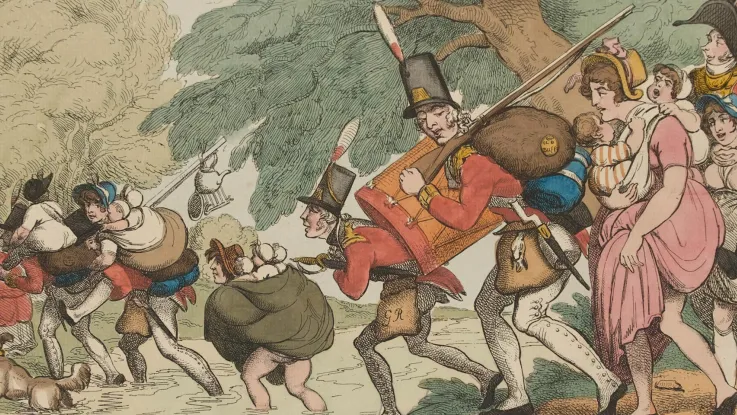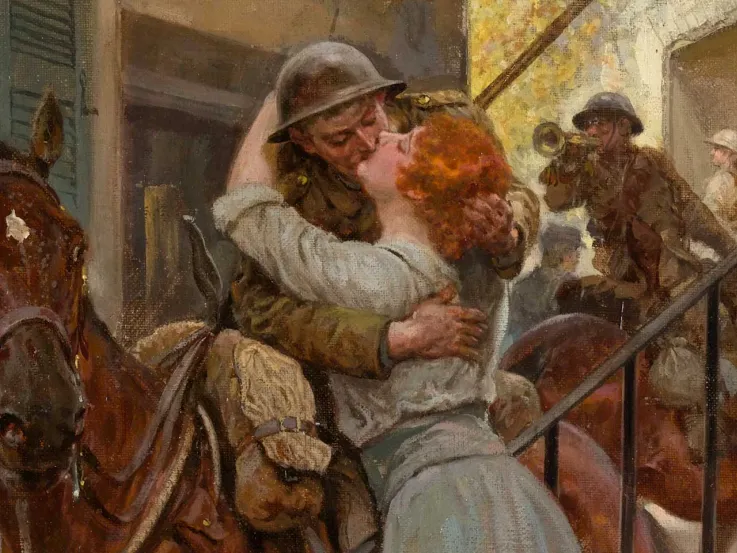Separation
The life of a soldier has always entailed long periods of separation from loved ones. Until the late 19th century, the average private soldier was likely to spend two-thirds of his 21-year period of service abroad, often in India. During the World Wars, soldiers could be parted from their sweethearts for periods of up to six years. And, more recently, between 2001 and 2014 soldiers served on six-month tours of duty in Afghanistan.
The Army has always done its utmost to provide a fast and reliable postal service to allow soldiers to communicate with the people at home. The first Army Post Office opened in 1808 during the Peninsular War (1808-14). Today, soldiers keep in touch with loved ones via telephone and email.
The significance of keeping partners in contact with each other remains crucial in ensuring that relationships survive military service.
Charlie Cole
Private Charlie Cole served with 7th Battalion, The Buffs (East Kent Regiment) during the First World War (1914-18). In 1918, he became a prisoner of war and was incarcerated at Stendal in Germany. While there, he wrote a series of postcards to his wife Martha, expressing how much he missed her and his children. In all of his messages, he expressed his wishes to be home soon.
In January 1919, when Charlie had still not returned home, his wife wrote to the Red Cross asking about his fate. They wrote back, telling her that Charlie had died in captivity on 17 September 1918.
‘Dear Wife, Give my love to Mother and Family and lots for yourself. Now kiss all the children for me and heaps for you dear when I see you again. Now I must close, hoping to see you soon. Now so I must say goodnight and God Bless you all from your ever loving Husband Charley, who is always thinking of you dear xxxxxxxxxx’Postcard from Private Charlie Cole, a prisoner of war in Germany — 1918
Robert Porter
Quartermaster Sergeant Robert Porter was a member of the 28th (North Gloucestershire) Regiment. He took part in the Napoleonic Wars (1803-15), fighting at the Battles of Quatre Bras (16 June 1815) and Waterloo (18 June 1815).
Following the victory at Waterloo, he wanted to let his wife know that he was alive. Unable to get a letter to her, he instead sent her a token of his love, a pair of interlocking gold rings in a glass box. Delivered personally by a comrade, the rings were engraved with their names, ‘Robert’ and ‘Amelia’.
Mabel Baker
Mabel Baker’s husband, Sergeant Anthony Baker (above), was a member of the Royal Army Pay Corps during the Korean War (1950-53).
She wrote her husband detailed letters, often filled with her daily activities, updates on friends and family, and life on the army base. In one of these letters, Mabel recalled how she and a friend had ‘hared off’ to the NAAFI for a cosmetics sale. But it's also clear that Mabel sorely missed her husband while he was abroad.
Anthony likewise missed home. He addressed all of his letters to Mabel: ‘To the only girl who ever mattered’.

One of Mabel's long letters to Anthony, 17 November 1950
‘You’re in my thoughts always, I never realised how much my happiness depended on you until this separation so please my love take care of yourself, goodnight and god bless. All my love Mabel.’Letter from Mabel Baker sent to her husband Anthony, while he was serving in Korea — 1950
William Lee
Lieutenant William Lee was a member of the 16th Queen’s Light Dragoons. He served in Europe between 1787 and 1792. During his service he met Marianne, a French woman with whom he had an affair.
Lee left Marianne behind in Chabrac, pregnant with his child.
‘I have the doctor saying that I am pregnant and that going in a carriage harmed me. But that does not prevent me from being pregnant and that is from you and nobody else. Yes, my dear friend, I will make you a dear little Lee who will be charming and nice like his father.’Letter from Marianne to Captain William Lee — 1787
Marianne wrote to Lee asking for money to care for the baby. But by this time she too had moved on. She informed him that she was now with another man. Still, she assured Lee in a letter that this ‘would not prevent me from leaving the old man and flying to you if you love me and intend to live with me’.
From Marianne’s letters it appears that Lee met with her soon after. He evidently disliked having a rival for his affections, but ultimately cared little about her or his child’s fate as it seems that he later lost interest.
There was a strong misogynistic culture within the army during the 18th century. Wives, camp followers and prostitutes alike were perceived as whores by servicemen, and womanising was rife.
One of Lee’s comrades wrote to him complaining of a serving girl he met, who could not be persuaded to sleep with him ‘either by force or gentle means’.
Indeed, less than a year after leaving Marianne, William Lee had a new lover - Zinette Desincourt, a Parisian actress.
‘Write to me very often, you cannot imagine how much I like to read your letters. Farewell, my friend, I kiss you with all my soul and I am yours for life, Your Zinette’Letter from Zinette Desincourt to Lieutenant William Lee — 1788
Heather Taylor
Heather Taylor (above) from Streatham in London joined the Women’s Land Army during the Second World War (1939-45). While working at farms in Halesworth and later Framlingham in Suffolk, she struck up friendships with several American airmen of the United States Army Air Forces.
Like many young British women, she was enchanted by the dashing, well dressed ‘Yanks’. But after the war, in December 1946, she received a letter from one of her American companions, Rodney from Ohio.
‘I have always loved you from the time I first saw you... nor will I ever stop loving you. Say that you love me and that you will be my bride... I need you Heather, as you need me.’Letter from Rodney to Heather Taylor — 1946
He wrote her a passionate declaration of love, asking her to marry him and expressing his heartache at their separation. He asked: ‘Have we not both been haunted by these months apart by the fond memory of one another?’
Clearly not. Heather refused his proposal and never married.













